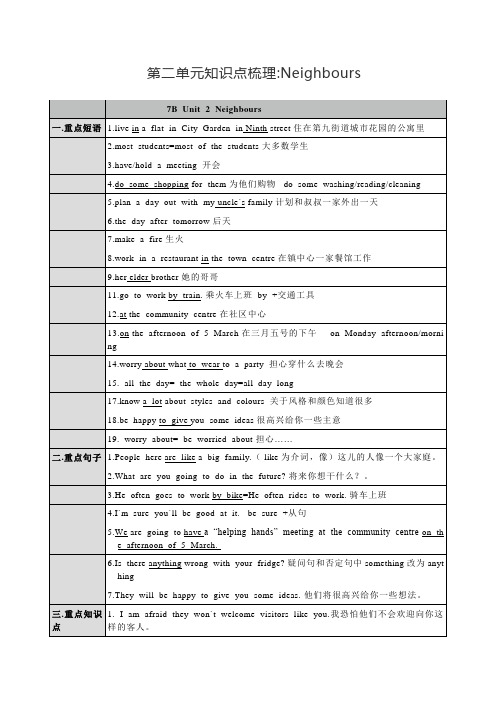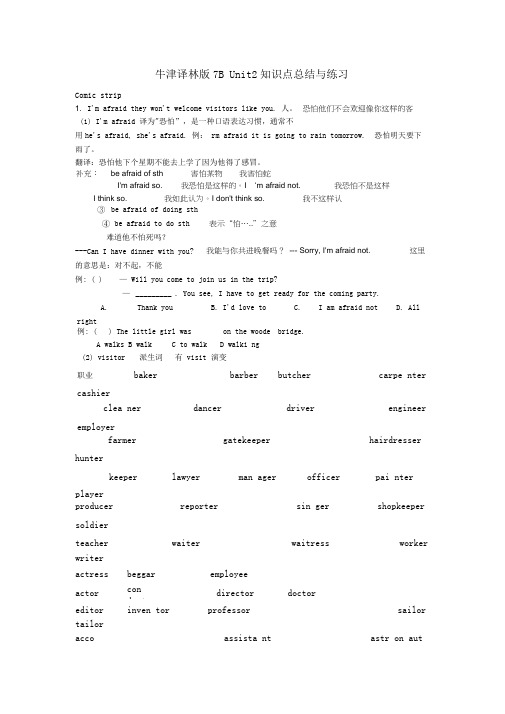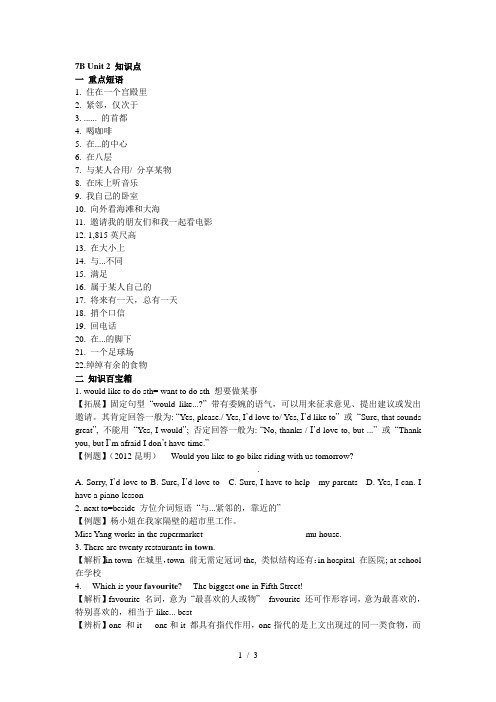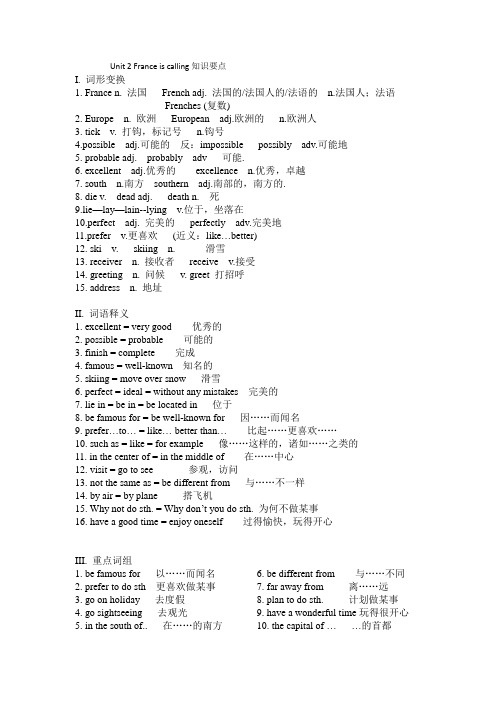牛津英语7B U2知识学习
牛津英语7B+Unit2词组和重点句子

二、重点句子及讲解1 I’m afraid they won't welcome visitors like you.(page 18,Picture 4)恐怕他们不会欢迎像你这样的客人。
⑴I’m afraid…意为‘‘我恐怕(担心)……”,可用于表达意见或建议,使语气变得委婉。
I’m afraid you are late now 我恐怕你迟到了。
⑵句中的like是介词,意思是“像,类似;像……一样”。
如:Don’t look at me like that.别像那样看着我。
He looks after me like my father。
他像我爸爸一样照顾我。
She likes me like my mother。
她像我妈妈一样喜欢我。
2.They help us with all kinds of problems.他们帮助我们解决各种各样的问题。
help sb.with sth.表示“在某方面帮助某人’,而如要表示“帮助某人做某事”,则使help sb.(to)do sth.结构.例如:Li Hua often helps his mother with some housework.李华经常帮他妈妈干些家务活。
My neighbor often helps me (to) look after my son.我的邻居经常帮我照看儿子..3 They often meet at the community centre and share their different skills.(page 20,lines 3—4)他们经常在社区中心集中,并和大家分享各自的一技之长.★4 There’s something wrong with my computer.(page 20.1ines 9—10)我的电脑出故障了。
句型there is something wrong with something 相当于something is not working well.意思是“某物坏(失灵)了".此意还可以用something is broken表达。
牛津译林7BUnit2知识点梳理

牛津译林7BUnit2知识点梳理牛津译林7B Unit 2知识点梳理Welcome1. meet sb. 和某人见面/见某人 . meet --- meeting n. have a (class/ parent s’) meeting 开班会/开家长会2. welcome sb. 欢迎某人. welcome to sp. 欢迎到某地. You are welcome. 没关系/ 不用谢。
3. like 像. visitors like you 像你这样的拜访者. a new neighbourhood like that 一个像那样的新街区. a bike like yours 像你的一样的一辆自行车4. be afraid of sth. . eg. I am afraid of ghosts. 我害怕鬼。
. be afraid to do…. eg. I am afraid to go out at night. 我害怕在晚上出去。
. be afraid that 从句(委婉语气,表示说话人的担心或看法) . I am afraid (that) he won’t come tomorrow afternoon.我恐怕他明天下午不会来。
. I am afraid not. 我恐怕不是(能)。
/ I am afraid so. 我恐怕是这样。
5. cook 厨师---- cooker 厨具. eg. a rice cooker 电饭煲6. Where do you live? \ Which place do you live in?你住在哪儿?Where are you going? \ Which place are you going to? 你要去哪儿?7. in Ninth Street 在第九大街. in your neighbourhood 在你的街区. around your neighbourhood 在你的街区周边8. one of them 其中之一. some of them 其中一些. most of them 其中大多数9. It’s good to live in a neighbourhood like that.住在像那样的一个街区是很好的。
[VIP专享]新7BU2知识点讲解(译林牛津版)
![[VIP专享]新7BU2知识点讲解(译林牛津版)](https://img.taocdn.com/s3/m/e69c33ae0b4c2e3f5627631e.png)
Welcome to the unit 1、 waiter waitress 均可数名词
2、 How many buildings are there in your neighbourhood? neighbourhood 为不可数名词,“街区,居民区” 常用短语:in the neighbourhood 在街区 in the neighbourhood of “大约,左右” 3、 Most of them have 14 floors. Most of 表示“……中的大多数”,后接可数名词复数作主语时,谓语动词用复数形式; 也可接不可数名词,此时谓语动词用单数形式。 Eg: 大多数男孩喜欢足球。____________________________________________________ 大部分水是干净的。____________________________________________________
88.8918÷.12990.÷1=4214÷3922=.0034=1÷15251371=8.535.78208÷.0232173c0*0÷1=m920.30392.2c=1÷203m=2÷1202.52=3535=42314)c*5232m40341*.31252=3.*1.153.5*03134.2*920522..104455=+21*3*50202.2.0285.4850.13*50+5c8*125*12m0.2+050.+0*014.852*0051000+0+/038.T+0÷+=55*+1011+010+91÷0145405*00010200+5+0+080+40*04+***115.103910*-%*C%6(+÷3;*÷414.m2371e=%7)8n08%.=s8.5=77.93cc60.mc*m4*m13,101w9.9o.k24mc-.cem5nm2csp2665m*9..03-4.50c60*5.pc3m85,9cm0.5g.i50mr0l-.p.s85p/6c50bc.0om7m.yp.cs6pc5m+;c0m..m7.ckm; 1+1k+12+1+k2234=1c+m1++4+4+2
牛津英语7B-U2-复习要点

7B (Unit 2) 复习要点1.饿be hungry觉得饿feel hungry挨饿get hungry (反:full)2.冰箱里只有一听狗食了。
There is only one tin of dog food in the fridge.3.多少(钱)how much (money)多重how much;How much is the box?4.唯一一元钱only one yuan5.用一元钱我们能买几听狗食?一听都不能。
How many tins of dog food can we buy with one yuan? None.6.订个比萨饼order a pizza预订一辆出租车order a taxi7.也许,可能maybe;也许他还是个学生。
Maybe he is a student. / He may be a student.8.一群(交换)留学生 a group of exchange students9.打电话去告诉某人phone to tell sb.10.非常喜欢吃中国食物enjoy eating Chinese food11.打羽毛球play badminton12.看电影watch/ see films; 去电影院go to the cinema13.在体育中心in the sports centre14.把他们带到大卖场去take them to the shopping mall15.有关阳光镇的一段录象 a video about Sunshine Town16.欢迎来到某个地方welcome to a place17.有许多事情要做。
There are lots of things to do.在图书馆有许多书供我读。
There are many books to read for me in the library.18.告诉我关于这个了不起的新兴镇的生活tell me about life in this great new town19.告诉某人(不)做某事tell sb. (not) to do sth.20.住在一个现代化镇上live in a modern town21.中国的首都the capital of China22.从北京市中心到这个镇乘地铁只要40分钟。
译林牛津版七年级英语下册7B U2知识点梳理:Neighbours

Most of the water is for drinking.大多数水都是用来喝的。
Most of the students in our class are boys.我们班大多数学生是男生。(注意主谓一致)
9.That sounds like a good idea.那听起来像是个好主意。(That sounds good!)
sound like +名词词组听起来像…… look like …看起来像……
sound(听起来)/look(看起来)/feel(感觉)/smell(闻起来)/taste(尝起来)/become(变得,成为),以及be动词,都是动词家族中较特殊的一类词,叫做“连系动词”,一般后接形容词,而大多数行为动词要用副词来修饰。
What do/does sb. look like?某人长什么样子(外貌)?
4. They often meet at the community centre and share their different skills.
different +名词复数
5.Some of them are volunteers.他们中有一些人是志愿者。
eg. They look cool!他们看起来很酷!The music sounds beautiful!音乐听起来很美妙!
10.Some college students are ready to help.一些大学生乐于帮忙。
be ready to do sth.准备/乐于做某事be ready for sth为……做好准备
(完整word版)上海牛津版英语7BU2重点词汇整理

7BU2重点词汇整理2014-3-1一. 重要词汇词性转换choose (v.) 选择---chose (v.过去式)--- chosen(v.过去分词)---choice (n.) 名词discuss (v.) 讨论---- discussion (n.) 讨论fun (n.) 乐趣--- funny (adj.) 滑稽的stupid (adj.) 愚蠢的---stupidly (adv.) 愚蠢地act (v.) 表演,扮演--- action (n.) 动作--- activity (n.) 活动actor (n.男演员) ---actress (n.女演员)waiter(n.男服务员) --- waitress (n.女服务员)prince (n.王子) --- princess (n.公主)astronaut(n.宇航员)--- astronautess(n.女宇航员)laugh (v .) 大笑---laughter (n .) 笑声final (adj.) 最终的--- finally (adv.) 最后love (v. ) ---lovely (adj .) 可爱的excite (v .) 刺激--- exciting (adj.) 令人激动的, 主语为物--- excited(adj.) 感到激动的, 主语为人rob (v .) 抢劫--- robber (n .) 抢劫犯--- robbery(n .) 抢劫案形近词robot 机器人; rubber 橡皮擦; rabbit 兔子lucky (adj .)幸运的--- luckily(adv.)幸运地--- luck(n .)幸运---unlucky(adj .)不幸的---unluckily(adv.)不幸地happy(adj .)开心的---happily(adv.)开心地--- happiness(n .)幸福--- unhappy(adj .)不开心的---unhappily(adv.)不开心地fill (v .) 充满--- full (adj.) 满的diary (n .) 日记,记事薄–diaries (复数)二. 同义词汇及辨析同义hate doing sth.= dislike doing sth. 不喜欢做某事be full of = be filled with = be crowded with 挤满altogether = in all 总共have a look at = take a look at = look at 看一看want to do = would like to do 想要做某事表示建议做某事what about doing sth? = how about doing sth?= why not do sth? = why don’t we do sth?=shall we do sth? = let’s do sth.辨析1in space 在太空There are lots of stars in space.in the space 在…空间里We can put nothing in the space between these twodesks.in hospital 生病住院She broke her leg and now she is in hospital.in the hospital 在医院He works in the hospital.2.表示花费spend/ take/ pay/ costspend 主语为人, 句型为sb. spend … on sth.sb. spend …(in ) doing sth.例如I spent five yuan on this book. 这本书我花了五元钱.I spent one and a half hours doing my homework last night. take 主语为物, 句型为It takes sb. … to do sth例如It takes me five minutes to walk to school in the morning. pay 主语为人, 句型为sb. pay… for sth.例如I paid 90 yuan for the coat last Saturday.→ How much did you pay for the coat last Saturday?cost 主语为物, 句型为s th. cost sb. …例如The coat cost me 90 yuan last Saturday.三. 重点词组1. take/have a look at the film guide 看一看电影指南2. funny films 戏剧电影3. films about clowns 关于小丑的电影4. an action film 一部动作片5. films about adventures 关于历险的电影6. a love story about a swan princess and a prince 一个关于天鹅公主和王子的爱情故事7. a film about stupid clowns in the circus 一部关于马戏团里的愚蠢的小丑的电影8. a great adventure about astronauts in space 一个关于在太空中的宇航员的伟大的历险记9. a film with a lot of action 有许多武打动作的影片10. the most exciting film of the year 这一年最激动人心的电影11. a film about cowboys in a small town far away 一部关于在遥远小镇上的牛仔的电影12. look at the children’s diaries for Saturday 看孩子们星期六的日记13. play the violin 拉小提琴14. play the piano 弹钢琴15. get there from my home 从我家到那儿16. turn right into Sea Avenue 向右转进入海洋街17. walk along City Street 沿着城市大街走18. turn left into Park Road 向左转进入公园路19. on one’s right 在某人的右边20. the way to the cinema 去电影院的路21. the shortest route 最短的路线四.重点句型1. like the film about adventures—So do I .(Me too)—I don’t like the film about adventures—Neither do I .so+助动词/情态动词/系动词/+主语,表示“…也”,具体时态要跟上句一致neither+助动词/情态动词/系动词/+主语表示“与他人做法一致,也不…”具体时态也要跟上句一致e.g. They ate a lot of food. So did we.They didn’t eat a lot of food. Neither did we.I can reach the shelf.. So can I.I can’t reach the shelf. Neither can I.2问路和一些回答:-----How can I get there from my home ?/ which is the way to……?----First, turn right(left).Walk along …Street/Road/Lane/Avenue/ .Next, turn right(left)into…and walk along…Then, turn right(left)into…and walk along…Finally, turn right(left)into…and walk along…You will see …… on your left3 表示建议的句型,“做什么事情如何?”What about Police Story? 去看警察故事这部电影怎么样?What about + n./doing ? e.g. What about going to the cinema?= How about + n./doing ?Shall we see “Swan Lake” then? 我们去看天鹅湖好吗?=Let’s go to see “Swan Lake”, shall we?=Why not go to see “Swan Lake”?=Why don’t we go go to see “Swan Lake”?4 --How long is the film? 电影片长多久?-- It’s 120 minutes.→How long does the film l ast? It lasts 80 minutes.The duration of “Swan Lake” is 80 minutes。
牛津英语7B Unit 2课本知识整理(word版)

7B Unit 2 NeighboursWarm up一、重点单词1. neighbour n. 邻居2. visit v. 拜访;参观3. meet v. 遇见;会面4. afraid v. 害怕5. visitor n. 拜访者;参观者6. neighbourhood n. 街区;居民区7. discuss v. 讨论8. like prep. 像,类似;...怎么样二、重点词组1. be afraid of... 害怕...2. help each other 互相帮助三、重点句型1. --- Where are you going? 你打算去哪儿?--- I’m going to ... 我打算去...2. I’m afraid they won’t welcome visitors like you. 恐怕他们不会欢迎像你这样的访客。
Welcome to the unit一、重点单词1. below adv. 下面2. flat n. 公寓3. cook n. 厨师/ v. 煮菜4. building n. 建筑5. floor n. 层6. supermarket n. 超市7. restaurant n. 餐厅8. hospital n. 医院二、重点词组1. ask sb. about sth. 问某人关于某事2. talk about sth. 谈论关于某物3. in Ninth Street 在第九大街4. live in a flat 住在一个公寓三、重点句型1. Where do you live? =Which place do you live in? 你住在哪里?2. How many buildings are there in your neighbourhood? 你居住的街区有多少建筑?3. What do you have around your neighbourhood? 你居住的街区周围有什么?4. Do you like living here? 你喜欢住在这里吗?5. It’s good to live in a neighbourhood like that. 住在像那样街区真好。
牛津英语7B第2单元知识点归纳

牛津英语7B第2单元知识点归纳1.Welcome to Sunshine Town ( Welcome to +地点)2.There is no dog food.= There is not any dog food. ( no =not a/an / not any )3.How many tins of dog food can we buy with that (= with that money) ?4.none /no (1.none = no + 名词 2. none of ……3.none后不能接名词)How many chips are there on the table? There are none.5.order a pizza take them to the sports centre ( take sb. to +地点)6. Maybe you’re right. ===== You may be right. maybe = perhaps7.a group of exchange students from Britain== a group of British exchange students8.love shopping / like watching films/ enjoy eating Chinese food9.Would you like to live in a modern town?She’d like to visit the Great Wall.(句型转换,试一试?)______________________(一般疑问句)__________________________(否定句)_________________________(对the Great Wall提问)10.It is only 40 minutes from the centre of Beijing by underground.=It takes 40 minutes to go to the centre of Beijing from Sunshine Town by underground.11.There is less air pollution in Sunshine Town than in other areas of Beijing.12.a country park its name go walking for example on the ninth floor13.Most of us live in places like this. like :想,介词14.We like it because we are close to our friends.be close to : be far from open :close open : closed15.We do not have to go far if we want (=need) help with our homework.I have to leave now. __________________________________(一般疑问句)_____________________________(否定句)She has to stay at home now. ________________________________(一般疑问句)____________________________________________(否定句)16.You can shop until ten ……..17. lots of souvenirs try Beijing Duck18.choose any food you like /enjoy Beijing Opera (any/some的区别)(any用于肯定句表示“任何”)19.lots of Western restaurants one of the Chinese restaurant s never mind20.Why don’t you visit our local theatre ? =====_______________________________?21.teach us English (teach sb. sth)22. How many…/ How much…的用法区别How many chips/ how much ham23. waiter /shopper/ cook/ cashier a place to go if you are sick24. in the hospital /in hospital25.I think thirty of each will be enough26.What else do you want to buy? = What other things do you want to buy? other/else的区别?27. 15 loaves of bread (loaf—loaves)28 Noun + ‘s的用法,你知道吗?29. Do these postcards belong to Daniel?====_______________________________?30.too / also / either31.定冠词“the”、(1. 独一无二;2. 上文提及过的人或物)不定冠词a,an 、零冠词的用法,一定要记牢啊32. plan to hold a welcome party for …33. We’re preparing food and drink for the party.34. become good friends with…/make friends with…35.Don’t miss the great show at the Palace Museum.36. golden throne; works of art; Chinese paintings;37.There are lots of fun and interesting things to see .38.That sounds great.39.What time shall we leave in the morning ?40. We shall be there at 9 a.m. to enjoy a full day there.41.meet friends at the youth centre42.show sb. around…show sb.sth.= show sth. to sb.much pollution ride bicycles sun-sunny friends nearby (near/nearby的区别?)43.grow vegetables and flowers in the garden44.It takes me 20 minutes to get to the nearest town.=I spend 20 minutes getting to the ……45.I like going into town on my bicycle.= by bike.46. There’s not much pollution in the town because cars can’t go into the centre of the town.47..I think it is a wonderful place to live.18. It is 10 minute s’ walk from my school. ---How far is it from my school?19.I need 2 loaves of bread . ___________________________?She needs 2 loaves of bread. ___________________________?。
牛津译林版7B-Unit2-知识点总结与练习

牛津译林版7B Unit2知识点总结与练习Comic strip1. I'm afraid they won't welcome visitors like you. 人。
(1) I'm afraid 译为"恐怕”,是一种口语表达习惯,通常不用he's afraid, she's afraid. 例: rm afraid it is going to rain tomorrow. 恐怕明天要下雨了。
翻译:恐怕他下个星期不能去上学了因为他得了感冒。
③ be afraid of doing sth ④ be afraid to do sth 难道他不怕死吗?---Can I have dinner with you? 的意思是:对不起,不能 例: ( )— Will you come to join us in the trip?— _________ . You see, I have to get ready for the coming party. A.Thank youB. I'd love toC. I am afraid notD. Allright例: ( ) The little girl was afraid on the woode n bridge.A walksB walkC to walkD walki ng(2) visitor 派生词 有 visit 演变职业bakerbarberbutchercarpe nter cashierclea ner dancerdriverengineer employerfarmergatekeeperhairdresserhunterkeeperlawyerman agerofficerpai nter playerproducerreportersin gershopkeepersoldierteacherwaiterwaitressworkerwriteractress beggar employeeactor con ductor director doctoreditor inven torprofessorsailortailoraccoassista ntastr on aut恐怕他们不会欢迎像你这样的客 补充: be afraid of sth 害怕某物 我害怕蛇I think so.我如此认为。
牛津译林版7B-Unit2-知识点总结与练习汇编

牛津译林版7B Unit2 知识点总结与练习Comic strip1.I'm afraid they won't welcome visitors like you. 恐怕他们不会欢迎像你这样的客人。
(1)I'm afraid 译为“恐怕”,是一种口语表达习惯,通常不用he's afraid, she's afraid. 例:I'm afraid it is going to rain tomorrow. 恐怕明天要下雨了。
翻译:恐怕他下个星期不能去上学了因为他得了感冒。
补充:①be afraid of sth 害怕某物我害怕蛇②I'm afraid so. 我恐怕是这样的。
I‘m afraid not. 我恐怕不是这样的。
I think so. 我如此认为。
I don't think so. 我不这样认为。
③ be afraid of doing sth④ be afraid to do sth 表示“怕….. ”之意难道他不怕死吗?---Can I have dinner with you?我能与你共进晚餐吗?--- Sorry, I'm afraid not.这里的意思是:对不起,不能例:( ) —Will you come to join us in the trip?— . You see, I have to get ready for the coming party.A. Thank youB. I'd love toC. I am afraid notD. All right 例:()The little girl was afraid _____ on the wooden bridge.A walksB walkC to walkD walking(2)visitor 派生词有visit演变职业baker barber butcher carpenter cashier cleaner dancer driver engineer employerfarmer gatekeeper hairdresser hunterkeeper lawyer manager officer painter player producer reporter singer shopkeeper soldier teacher waiter waitress worker writer actress beggar employeeactor conductor director doctor editor inventor professor sailor tailor accountant assistant astronaut servant artist dentist host pilot priest scientist typist businessman fishman spaceman policeman postman seaman captain model DJ judgecook nurse clerk secretary(3)like介词像与…一样like 与as 的区别动词喜欢做某事2.Most of them have 14 floors.大多数楼有14层。
最新最新译林版牛津英语7Bunit2-neighbours知识点讲解

Unit2 Neighbours词汇/句型1.neighbour n.邻居拼写:居民区,社区2.meet(1)vt.遇见,碰见I met him in the street.(2)vt.迎接Will you meet her at the station?[拓展]Meet with 偶然遇见On my way home, I met with an old friend.3.afraid adj.害怕,畏惧(1)be afraid to do sth害怕做某事I’m af raid to go out alone at night.(2)be afraid of doing sth害怕……I’m afraid of falling into the river.(3 )be afraid that从句,表示恐怕……I’m afraid that I can’t help you.4.like prep.(1)像,类似Lily makes a kite like a butterfly.Don’t do it like that.(2)像…一样,常用词组look likeMy brother looks like my father.5.It’s good to live in a neighbourhood like that.It是形式主语,to live in a neighbourhood是真正的主语。
句式:It is+adj+(for/of sb) to do sth6.help sb. with sth翻译:他经常帮我复习英语。
help sb (to) do sth翻译:他经常帮妈妈打扫房间。
7.翻译:我的电脑出毛病了something interesting有趣的事8.词汇:(1)checkcheck in 登记,报到check out结账离开check up核对,检查check one’s answer 检查某人的答案ask for money 要钱10.someonesomeone 某人,用于肯定句,否定结构anyone翻译:有人正在敲门。
牛津译林新版7B-Unit-2-知识点

7B Unit 2 知识点一重点短语1. 住在一个宫殿里___________________2. 紧邻,仅次于___________________3. ...... 的首都_________________4. 喝咖啡____________________5. 在...的中心_________________6. 在八层____________________7. 与某人合用/ 分享某物_______________8. 在床上听音乐_____________________-9. 我自己的卧室_________________10. 向外看海滩和大海_______________11. 邀请我的朋友们和我一起看电影_________________________________________12. 1,815英尺高________________________13. 在大小上_____________________14. 与...不同______________________-15. 满足____________________________16. 属于某人自己的_________________________17. 将来有一天,总有一天___________________--18. 捎个口信_______________________19. 回电话__________________________20. 在...的脚下________________________21. 一个足球场_________________________22.绰绰有余的食物_______________________二知识百宝箱1. would like to do sth= want to do sth 想要做某事【拓展】固定句型“would like...?”带有委婉的语气,可以用来征求意见、提出建议或发出邀请。
7BU2 知识要点 (3)

Unit 2 France is calling知识要点I. 词形变换1. France n. 法国French adj. 法国的/法国人的/法语的n.法国人;法语Frenches (复数)2. Europe n. 欧洲European adj.欧洲的n.欧洲人3. tick v. 打钩,标记号n.钩号4.possible adj.可能的反:impossible possibly adv.可能地5. probable adj. probably adv 可能.6. excellent adj.优秀的excellence n.优秀,卓越7. south n.南方southern adj.南部的,南方的.8. die v. dead adj. death n. 死9.lie—lay—lain--lying v.位于,坐落在10.perfect adj. 完美的perfectly adv.完美地11.prefer v.更喜欢(近义:like…better)12. ski v. skiing n. 滑雪13. receiver n. 接收者receive v.接受14. greeting n. 问候v. greet 打招呼15. address n. 地址II. 词语释义1. excellent = very good 优秀的2. possible = probable 可能的3. finish = complete 完成4. famous = well-known 知名的5. skiing = move over snow 滑雪6. perfect = ideal = without any mistakes 完美的7. lie in = be in = be located in 位于8. be famous for = be well-known for 因……而闻名9. prefer…to… = like… better than…比起……更喜欢……10. such as = like = for example 像……这样的,诸如……之类的11. in the center of = in the middle of 在……中心12. visit = go to see 参观,访问13. not the same as = be different from 与……不一样14. by air = by plane 搭飞机15. Why not do sth. = Why don’t you do sth. 为何不做某事16. have a good time = enjoy oneself 过得愉快,玩得开心III. 重点词组1. be famous for 以……而闻名2. prefer to do sth 更喜欢做某事3. go on holiday 去度假4. go sightseeing 去观光5. in the south of.. 在……的南方6. be different from 与……不同7. far away from 离……远8. plan to do sth. 计划做某事9. have a wonderful time玩得很开心10. the capital of ……的首都11. at least 至少12. not only … bus also …不仅……而且……15. be known as 作为……而16. take a lift 坐电梯17. department store 百货商店18. walk up 走上前19. go down the stairs 走下楼梯20. be interested in 对……感兴趣21. on the coast 在海滨22. by the sea 在海边23. lie(be) on/in 位于24. take the lift 乘电梯25. make wine 制作红酒26.try to do sth. 努力做某事27.try doing sth. 尝试做某事13. learn about 了解28. be close to 对……不开放14 . in the future 在将来IV. 写作常用句型1. Shenzhen lies in the south of China.深圳位于中国南部。
上海市牛津英语7BU2笔记

Unit2 知识点梳理1.want to do= would like to do 想要做某事Which film would you like to see?= Which film do you want to see?(which 有范围,what 无范围)(want 只有一般现在时和一般过去时,没有其它时态)2.They are discussing which film to see. = They are discussing which film they will see.(疑问词+to do =疑问词+陈述句) (看到疑问词+句子要会改疑问词+to do)3.turn ) (v.~ left/right 向左/向右~ to 翻到,转向~ around 绕着…转~ on/off 打开/关掉~up/down 把电器开大/开小~ out 结果是,证明4.act 行动表演(v.)active(adj.) activity(n.) actor/actress 男/女演员(n.) action(n.)行动5.discuss=talk about 谈论,讨论6.take a look at…= look at …看一看= have a look atughter n. 笑声laugh v. 大笑laugh at 嘲笑8.倒装句1)I like funny films. So do I (倒装句。
相当于I like funny films, too.)2)I don’t like funny films Neither do I (相当于I don’t like funny films, either.)3)He is a good student. So am I4)He isn’t good at maths. Neither am I.5)They have been to Beijing. So have we.6)We won’t go there. Neither will they.9.表达是何种类型的电影,可以直接说,action films ‘动作片’, funny films ‘搞笑片’love film 爱情故事cartoon 卡通片 exciting film 惊险片 cowboy film 西部片,牛仔片horror story 恐怖片 police story 警匪片 documentary 纪录片;也可以用about 来说,如:films about adventures ‘冒险片’about the adventures of some astronauts in space 有关几个宇航员在太空的冒险(冒险前有the 表示特指几个宇航员在太空的冒险,而不是其他人在别处的冒险,往往有‘的’是特指/指定范围,需要用the 的标志。
江苏新版牛津英语7B-Unit-2-知识点

7B Unit 2 知识点Comic strip1.I’m going to visit our new neighbours. 我将要去拜访我的新邻居们。
1) visit v. 参观,拜访visitor n. 访问者,参观者eg: They are visiting Shanghai. 他们正在参观上海。
visit sb. 拜访某人visit sp. 参观某地eg: I’m going to visit my aunt. 我打算去看望我的姑妈。
Many tourists visit China every year. 每年都有许多游客到中国参观。
visit n. 访问,参观eg: They go on a visit to the seaside. 他们去海边游玩。
2) neighbour(s) 邻居n. 美式: neighbor(s)eg: Everyone wants a nice neighbour. 每个人都想要一个好邻居。
2.I’m afraid they won’t welcome visitors like you. 我恐怕他们不会欢迎像你们这样的游客。
1) I’m afraid… 用于礼貌或正式道歉或表示遗憾、对不起、恐怕等,一般用作插入语。
eg: I’m afraid I must leave. 恐怕我得走了。
I’m afraid not 恐怕不行,表示认为对方的意见可能不会发生,是委婉的否定。
eg: ---Would you like to go shopping with me? ---I’m afraid not. I have to do my homework.---和我去购物怎么样?---恐怕不行。
我得做家庭作业。
2) like prep. 像,相似,类似,不能单独使用,要与动词连用be like 像look like 看起来像seem like 仿佛,似乎eg: The Sun is like a great ball of fire. 太阳像个巨大的火球。
- 1、下载文档前请自行甄别文档内容的完整性,平台不提供额外的编辑、内容补充、找答案等附加服务。
- 2、"仅部分预览"的文档,不可在线预览部分如存在完整性等问题,可反馈申请退款(可完整预览的文档不适用该条件!)。
- 3、如文档侵犯您的权益,请联系客服反馈,我们会尽快为您处理(人工客服工作时间:9:00-18:30)。
学科教师辅导教案T——7B U2知识点复习重点短语句型1.be going to +动词原形计划、打算做某事2.meet sb 见、接某人3.I’m afraid…我恐怕…(委婉的建议或意见)4.like prep.(介词) 像、类似、像…一样eg. I’m afraid they won’t welcome visitors like you.5.询问职业What do\does sb do?What be sb?What is his\her job?6.on North Street 在北街7.most of the…大多数的…8.know more about…知道\了解更多关于…know a lot about…知道\了解许多关于…9.share sth with sb 和某人分享某物share sth 分享某物10.help each other 相互帮助11.many\different\all kinds\styles of…12.in this way 通过这种方式by the way 顺便说一下13.at\on the weekend = at\on weekends14.某物坏(失灵)了There is something wrong with sth.sth is not working well.sth is broken.15.find sb to do sth 发现某人做某事16.ask sb to do sth 要求、请求某人做某事17.a computer engineer 一个电脑工程师18.help sb do\with sth 帮助某人做某事19.college student 大学生20.be\get ready to do sth 淮备做某事; 准备做某事; 准备某事; 为做某事做好了准备be ready to (do)装备好; 乐意做; 乐意be\get ready for sth强调动作为做某事做好准备21.It’s lucky for sb to do sth做某事(对某人来说)很幸运be lucky to do sth 做某事很幸运22.show sb sth = show sth to sb 向某人展示某物23.get(得到)some help from sbgive(给)help to sbgive help with sth24.no problem 没问题25.wait for sb 等待某人26.turn on 打开turn off 关闭27.go for a picnic 去野餐go out for a picnic 外出野餐28.in the future 在将来29.a sick boy 一个生病的男孩30.I’m sure 我确定…31.have to + 动词原形不得不做某事(客观)must do sth 必须做某事(主观)32.(be)far (away)from 远离…33.in the community centre34.well adj.身体好的、健康的feel welladv.好地、令人满意的feel good 内心感觉愉悦、有信心35.don’t worry 别担心worry about sth\sb v. 担心某事或某人be worried about sth\sb adj. 担心某事或某人36.make sb do sth. 使某人做某事37.give sb some ideas 给某人一些建议38.an office worker39.the day after tomorrow 后天40.will\shall\be going to +do(动词原形)41.stay with sb 和某人在一起go\come with sb 和某人一起去\来42.We are going to have a meeting.There is going to be a meeting.C—一般将来时一.意义:表示将来某个时间要发生的动作或存在的状态,也表示将来经常或重复发生的动作,常与表示将来的时间状语连用。
如:tomorrow , soon ,next Monday , next year , next weekend , this afternoon , this evening,the day after tomorrow(后天)等。
二. 构成及变化一般将来时常用的两种结构1.be going to+动词原形: 表示打算、准备做的事或即将发生或肯定要发生的事。
2.shall/will [wil] +动词原形: 表示将要发生的动作或情况,没有太多的计划性, 还用来表示意愿。
㈠be going to +动词原形1.肯定句:主语+ be(am ,is,are) going to +动词原形+其它成份。
My sister is going to learn English next year.我姐姐准备明年学英语。
2.否定句:主语+be(am,is,are)not+going to +动词原形+其它成份I am not going to(go to)the cinema tonight. 我今天晚上不打算去看电影。
3.一般疑问句:Be (am / is / are)+主语+going to+动词原型+其它成份…?Is your father going to play basketball with you ?No , he isn’t./Yes,he is.你父亲打算和你去打篮球吗?不,他不。
4.特殊疑问句特殊疑问词(Wh-)+一般疑问句?Where are you going to spend Spring Fesital.? 春节你打算在哪过?5.注意: be going to 结构后面习惯上不跟go ,come 等表位移的动词,一般用该动词的进行时形式表示。
如:He’s going to New York next week.下周他要去纽约.㈡will /shall+动词原形(在书面语中,主语是第一人称时,常用shall ,在口语中,所有人称都可以用will)1.肯定句:主语+will/shall+动词原形+其它成份I (shall) write to him next week. 下周我将给他写信。
2.否定句主语+ will /shall+ not + 动词原形+其它成份They won’t watch TV this evening.今天晚上他们不看电视。
3.一般疑问句will/shall+主语+动词原形+其它成份Will you stay at home with us tomorrow ?明天你和我们呆在家里好吗?4.特殊疑问句特殊疑问词(Wh-) +一般疑问句When will your father be back? 你爸爸什么时侯回来?附:Shall I /we …常用来征求对方意见,而问对方是否愿意,或者表示客气的邀请,常用Will you…?他们的回答比较灵活。
1.Shall we go to the park ?肯定Sure , let’s go .否定No , let’s go to the cinema.2.Will you please come to my birthday party next week ?下周你请到我的生日聚会来?肯定Yes, I will. / Sure .否定I’m sorry. I’m afraid I can’t.区别:(1)be going to主要用于:1、表示事先经过考虑、安排好打算要做的事情。
E.g. Dad and I are going to see a Beijing opera this afternoon.今天下午我和爸爸打算去看京剧。
2、表示根据目前某种迹象判断,某事非常有可能发生。
E.g. Look! There come the dark clouds. It is going to rain.瞧!乌云密集,天要下雨。
I am afraid I am going to have a cold. 恐怕我要患重感冒。
(2) will主要用于在以下几个方面:1、表示单纯的未来“将要”通用各个人称。
eg: They will go to visit the factory tomorrow.明天他们将去工厂参观。
2、表示不以人的意志为转移的自然发展的未来的事。
eg:Today is Saturday. Tomorrow will be Sunday.今天是星期六。
明天是(将)是星期日。
3、问对方是否愿意做某事或表示客气地邀请或命令。
eg: Will you please turn on the radio? 请打开收音机好吗?Will you go to the zoo with me? 你和我一起去动物园好吗?练习:一.填空1. 我打算明天和朋友去野炊。
I_____ _______ _________ have a picnic with my friends.I ________ have a picnic with my friends.2. 下个星期一你打算去干嘛? 我想去打篮球。
What ________ ________ _________ _________ _________ next Monday?I _______ ______ _____ play basketball.What ______ you do next Monday? I ________ play basketball.3. 你妈妈这个周末去购物吗?是,她要去买一些水果。
_____ your mother _______ ________ go shopping this ___________?Yes, she ________. She ______ ________ __________ buy some fruit.4. 你们打算什么时候见面。
What time _______ you _________ __________ meet?二句型专换5. Nancy is going to go camping.(改否定)Nancy ________ going to go camping.6. I’ll go and join them.(改否定)I _______ go ______ join them.7. I’m going to get up at 6:30 tomorrow.(改一般疑问句)________ _______ ________ to get up at 6:30 tomorrow?8. We will meet at the bus stop at 10:30.(改一般疑问句)_______ ________ meet at the bus stop at 10:30.9. She is going to listen to music after school.(对划线部分提问)________ _______ she ________ ________ _________ after school?10. My father and mother are going to see a play the day after tomorrow.(同上) _________ _________ going to see aplay the day after tomorrow.三.用所给词的适当形式填空。
